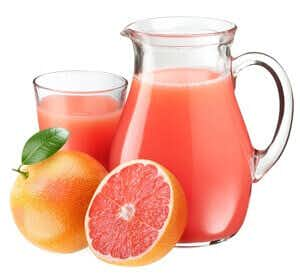
Grapefruit has a reputation for having lots of health benefits. It has been promoted for its ability to help people lose weight. One study reported that a grapefruit extract reduced weight gain in obese rats (Journal of Medicinal Food, Aug. 2015). Grapefruit also seemed to reduce insulin resistance and inflammation. Whether grapefruit would be helpful for overweight humans is less obvious (Metabolism, July, 2010). Other research suggests that red grapefruit helps lower triglycerides and cholesterol (Journal of Agricultural and Food Chemistry, March 8, 2006). For this discussion, though, we will try to answer an intriguing question from a reader: “Will grapefruit lower blood pressure?”
Grapefruit and Blood Pressure:
Q. I take nifedipine for high blood pressure. Lately the medicine wasn’t controlling my blood pressure, so my doctor added lisinopril. That brought the blood pressure down, but it made me cough.
When I went back to my doctor, she dropped the lisinopril and increased the dose of nifedipine. My BP was in the 150/90 range, still on the high side.
My medicine bottle says, “avoid grapefruit,” but the past few weeks I gave in to temptation and bought several. I continued my medication and ate a grapefruit every day. My blood pressure readings have been great: 118/67, 126/72, 114/68!
When I ran out of grapefruit, I was shocked to see the readings climb again. So now I need to go get more grapefruit.
Did Grapefruit Lower Blood Pressure?
The answer to this question is complicated because there are two issues to deal with. One has to do with the direct grapefruit effect on blood pressure. The other has to do with the potential for grapefruit to interact with blood pressure medicine. Let’s tackle the second issue first:
Grapefruit and Drug Interactions:
Dozens of medications are affected by grapefruit. They include some cholesterol-lowering drugs: atorvastatin (Lipitor), lovastatin (Mevascor) and simvastatin (Zocor). Heart rhythm medicines amiodarone (Cordarone, Pacerone), dronedarone (Multaq) and blood pressure pills felodipine (Plendil) and nifedipine (Adalat CC) are also affected by grapefruit.
Grapefruit juice can raise blood levels and magnify the effects of such medicines. That means grapefruit may also increase the risk of adverse reactions. In the case of statins, that could mean muscle pains and weakness. We worry even more about the combination of amiodarone or dronedarone with grapefruit. Such a combination could be life threatening. Dangerous heart rhythm disturbances could result. Other complications could include nausea, vomiting, diarrhea, heart failure and kidney damage.
Grapefruit and Nifedipine:
The grapefruit drug interaction effect was first reported in 1991 (Lancet, Feb. 2, 1991). Canadian researchers accidentally discovered that a glass of grapefruit juice could dramatically boost blood levels of felodipine and nifedipine. When we started talking about this interaction over 25 years ago, a lot of health professionals laughed. They couldn’t imagine how grapefruit or grapefruit juice could have a clinical impact on medication. But now, this interaction is widely recognized.
Doubling or tripling the dose of a medication by impeding its metabolism means unintended impact. That means the combination could boost effectiveness and lower blood pressure even more than planned. But it could also increase the risk of complications. Side effects are more likely with grapefruit on board.
Nifedipine Side Effects:
- Low blood pressure (hypotension), dizziness, fainting
- Fluid retention in extremities, edema in hands and feet, swollen ankles
- Flushing
- Fatigue, malaise, weakness
- Digestive upset (nausea, constipation)
- Heart rhythm changes, palpitations
- Stuffy nose
- Muscle cramps
- Congestive heart failure
- Skin reaction (requires immediate medical attention!)
The fact that the combination of grapefruit and nifedipine lowered blood pressure into the “normal” range is not necessarily as desirable as you might think. It could also mean you are getting too much medicine. Remember, your doctor already increased your dose.
A Case Study of Grapefruit & Nifedipine:
A study published in the journal Clinical and Experimental Hypertension (Jan. 2010) reports a very similar situation to yours:
The authors explain their protocol & results:
“The purpose of this study was to examine the effects of ingestion of grapefruit juice or grapefruit on the hypotensive effect and plasma concentration of dihydropyridine calcium antagonists, i.e., amlodipine and nifedipine. A 50-year-old man with essential hypertension was studied. Grapefruit juice (500 ml) was taken together with the antihypertensive drug, while one grapefruit was taken before drug ingestion…
“At 11:00 on day 2, 3 hours after drinking grapefruit juice, the subject felt mild dizziness. The blood pressure was 116/70 mmHg and was markedly lower than the values of 152/92 mmHg on the control day…
“In the present study, a single intake of grapefruit juice increased the plasma concentration of nifedipine and also decreased blood pressures 3 hours after intake of grapefruit juice…”
“…we conclude that ingestion of a relatively large amount of grapefruit juice may cause a decrease in blood pressure in patients who are treated by nifedipine.”
We found it quite fascinating that in this case study the patient’s blood pressure went from 152/92 to 116/70 after consuming grapefruit juice. You reported that your blood pressure went from the 150/90 range to 118/67 in a somewhat similar self-imposed “experiment.” Although one can never generalize from such a coincidence, the numbers are surprisingly close.
Grapefruit and Lower Blood Pressure:
Grapefruit all by itself can lower blood pressure (Critical Reviews in Food Science and Nutrition, Feb. 2017). One study of postmenopausal women reported that 11.5 ounces of grapefruit juice a day “is beneficial for arterial stiffness.” Improving arterial flexibility is a good thing (American Journal of Clinical Nutrition, July, 2015).
Will Grapefruit Lower Blood Pressure?
You shouldn’t count on grapefruit as a substitute for your medication. Although you have seen how grapefruit increases the effectiveness of your nifedipine, side effects could be more common. Please discuss your grapefruit tactic with your doctor.
Learn more about grapefruit interactions with many other drugs by downloading our FREE Guide to Grapefruit Interactions at this link.
Share your own grapefruit story in the comment section below.

